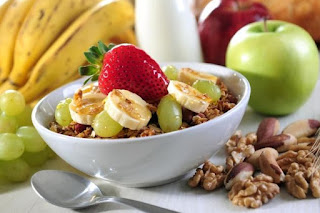 The
change from a "Western" diet with lots of fat and meat to a diet rich
in fiber only two weeks ago that the less favorable conditions for the
development of the large intestine colon cancer. The reverse switch can promote the formation of cancer.
The
change from a "Western" diet with lots of fat and meat to a diet rich
in fiber only two weeks ago that the less favorable conditions for the
development of the large intestine colon cancer. The reverse switch can promote the formation of cancer.The study also points the finger at the bacteria living in the intestines, known as the gut microbiome, as an essential link between diet and colon cancer.An international team of researchers recruited 20 men and women living in Pittsburgh African Americans and 20 Africans living in KwaZulu-Natal. All volunteers had searched their diet and analyzed gut microbiome. They also had a colonoscopy. This inspection of the large intestine (colon) showed that nine out of 20 Americans had polyps, small growths in the lining of the colon that can become a cancer. No polyps were found in any of the 20 South Africans.
For two weeks, Americans ate a traditional South African diet rich in fruits, vegetables, beans and plant foods. Africans ate a Western diet had two or three times more fat and protein, such as meat, their traditional diet. Then, participants were more colonoscopies and analyzed gut microbiome.In just two weeks, there have been significant changes in the lining of the colon and its chemical and bacterial composition. Those following the African diet showed significant reductions in other chemical signals have been associated with risk of colon cancer and colon inflammation.
In addition, their gut microbiome generated more butyrate, a byproduct of the metabolism of fiber which can help prevent cancer. In contrast, following the Western diet, they showed an increase in inflammation, generation butyrate reduction, and other changes that may lead to colon cancer.
Dietary changes are reflected quickly in the colon
The idea that diet can influence the risk of colon cancer is not new. What is striking in this study is the speed with which a change in the diet modifies the conditions in the colon.
Colon cancer is the fourth leading cause of cancer death worldwide. More than 600,000 lives each year. It is more common in some areas and less in other municipalities. These differences reflect the influence of race, ethnicity, diet, physical activity and other factors in the development of colon cancer.
In rural Africa, 5 out of every 100,000 blacks develop colon. In the United States 100 000 65 black developing the disease. This 13-fold increase is not likely to be explained by genetic differences.
It is not necessary to follow a traditional African diet to help prevent colon cancer. Here are some dietary changes that can help:
- Eat a diet rich in fruits and vegetables.
- Choose whole grains and foods made from them, instead of highly refined grains.
- Eat more beans and less red and processed meat.
- Getting enough vitamin D from sunlight, diet, pills or both of them.
Have a colonoscopy every five years or 50 years is another way to prevent colon cancer. Not only checks for the presence of cancer, but you can remove polyps potentially carcinogenic.












0 komentar:
Post a Comment
"Thank you for visiting my blog, please leave a comment in the space provided."